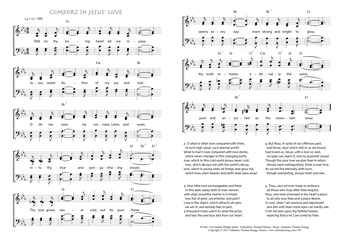Christ My Song - 130
Still on thy loving heart let me repose - Comfort in Jesus' love
(Carl Johann Philipp Spitta/Richard Massie/
Johannes Thomas Rüegg)
Comfort in Jesus' love.
1. Still on thy loving heart let me repose,
Jesus, sweet Author of my joy and rest;
O let me pour my sorrows, cares, and woes,
into thy true and sympathizing breast.
Thy love grows never cold, but its pure flame
seems every day more strong and bright to glow,
thy truth remains eternally the same,
pure and unsullied as the mountain snow. PDF - Midi
2. O what is other love compared with thine,
of such high value, such eternal worth!
What is man's love compared with love divine,
which never changes in this changing earth:
love, which in this cold world grows never cold,
love, which decays not with the world's decay,
love, which is young when all things else grow old,
which lives when heaven and earth shall pass away!
3. How little love unchangeable and fixed
in this dark valley doth to man remain,
with what unworthy motive is it mixed,
how full of grief, uncertainty, and pain?
Love is the object, which attracts all eyes,
we win it, and already fear to part,
a thousand rivals watch to seize the prize,
and tear the precious idol from our heart.
4. But thou, in spite of our offences past,
and those, alas! which still in us are found,
hast loved us, Jesus, with a love so vast,
no span can reach it, and no plummet sound.
Though the poor love we give thee in return
should seem extinguished, thine is ever true,
its sacred fire eternally doth burn,
though everlasting, always fresh and new.
5. Thou, who art ever ready to embrace
all those who truly after thee enquire,
thou, who hast promised in thy heart a place
to all who love thee and a place desire;
O Lord, when I am anxious and depressed,
and dim with tears mine eyes can hardly see,
O let me lean upon thy faithful breast,
rejoicing that e'en I am loved by thee.
Richard Massie, Lyra Domestica I, 1863, 34-35.
Translated from the German Still an deinem liebevollen Herzen - Trost in Jesu Liebe
of Carl Johann Philipp Spitta.

